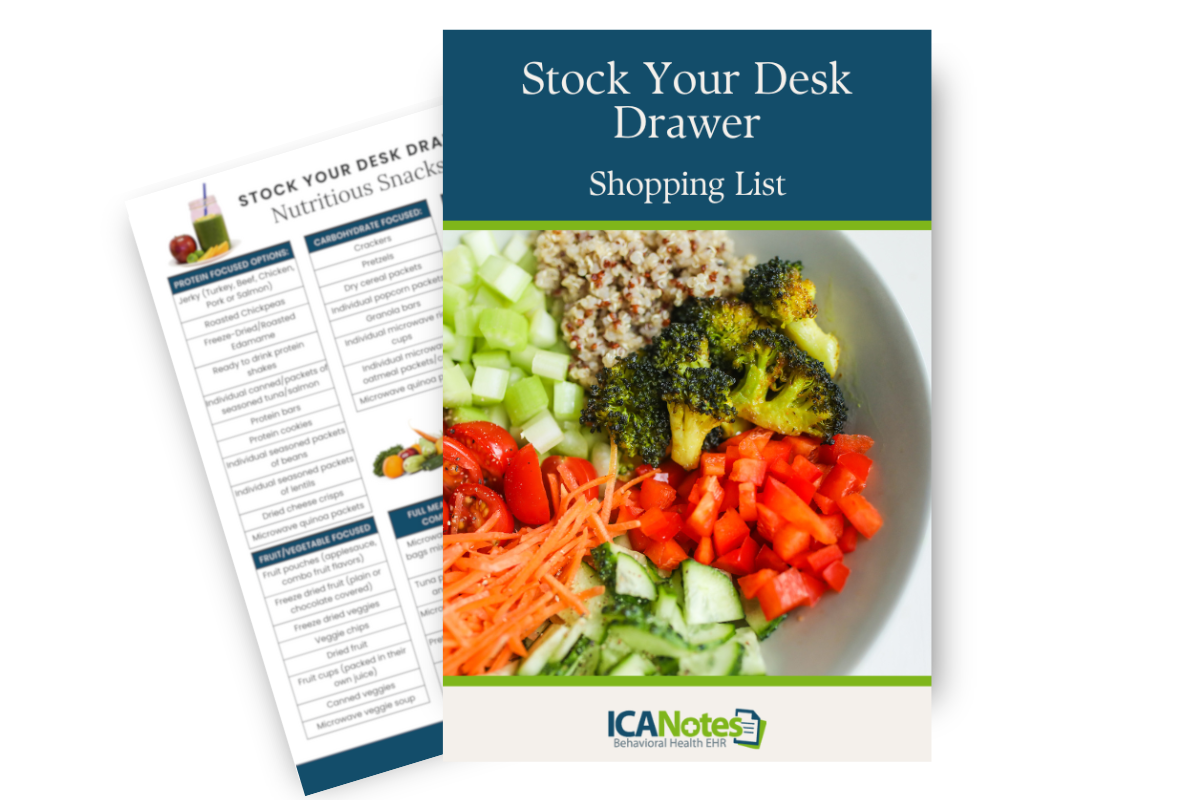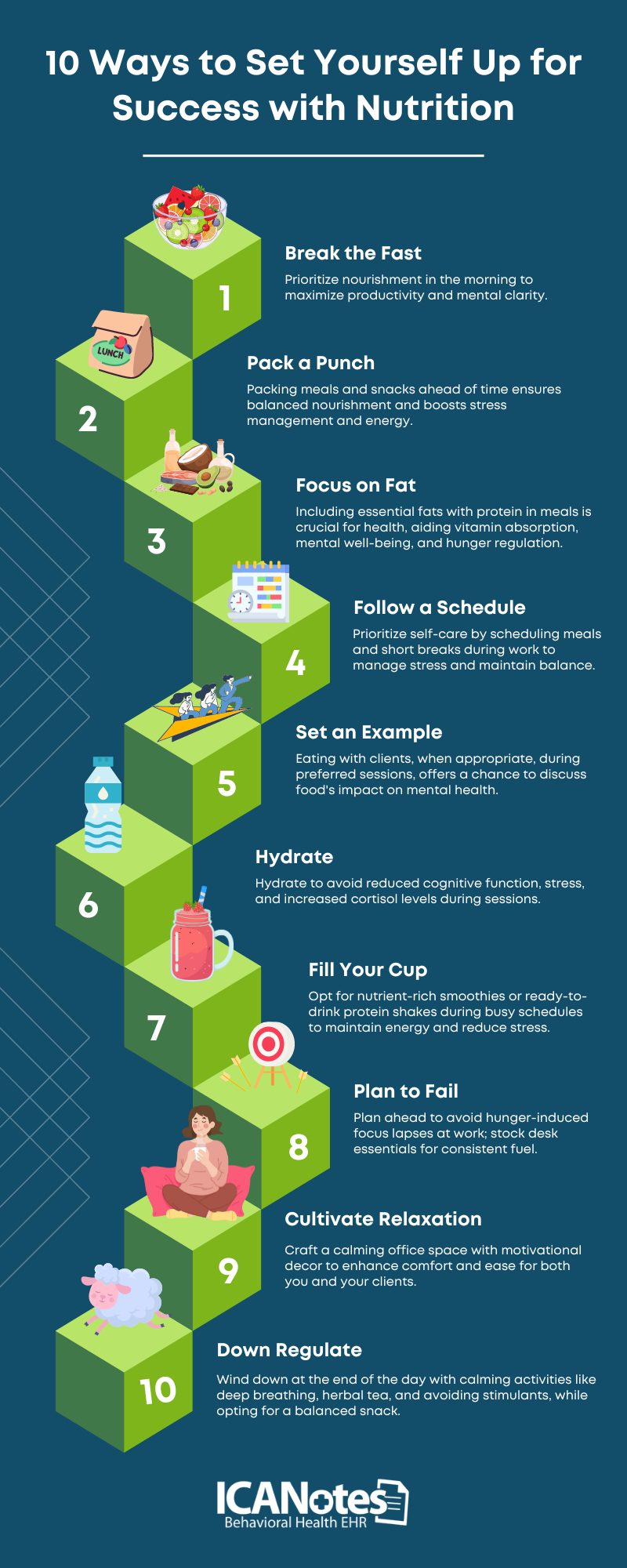
Food and Stress: How Nutrition Can Help Behavioral Health Providers Cope
As a behavioral health provider, your days are likely filled with helping others manage their emotions and stress. But what about your own stress? The connection between food and stress is crucial, and understanding how your diet impacts your mental health can help you regain balance. Whether it's stress from a full caseload or the demands of life outside work, nutrition plays a vital role in how you cope with and recover from stress.
When considering the impact of food on stress, it's essential to remember that while food can't solve every problem, it can support both mental and physical health. In fact, the relationship between stress and nutrition is well-established—what you eat can influence your mood, energy levels, and overall ability to handle stress. Let's explore 10 practical ways to adjust your diet to manage stress effectively.
Free Download: Stock Your Desk Drawer with Foods That Relieve Stress

10 Ways to Manage Stress with Food and Nutrition
1. Break the Fast: The Importance of Breakfast
Starting your day with a nourishing meal helps your body cope with stress. Breakfast is your body's cue to kick-start metabolism and provide the glucose your brain needs to function optimally. Eating a balanced meal in the morning can enhance mental clarity and help you feel more in control of your day, reducing the overall effects of stress on your body.
2. Pack Balanced Meals and Snacks
Planning ahead by packing meals and snacks is key to managing stress and food cravings throughout the day. Preparing balanced meals with a mix of carbohydrates, fats, and proteins keeps your energy stable, helps regulate hunger, and improves focus. Regular nourishment prevents stress from overwhelming your body and mind, allowing you to stay centered.
3. Focus on Healthy Fats
Fats are often misunderstood, but they are crucial for stress management and overall brain function. Omega-3 fatty acids, for example, are linked to improved cognitive performance and mental health. Incorporating sources of healthy fats—such as avocados, nuts, and fatty fish—into your diet can support brain health and help your body manage stress more effectively.
4. Follow an Eating Schedule
When you're busy focusing on clients, it's easy to neglect your own needs, including regular meals. However, scheduling time to eat—even if it's just a quick snack between sessions—helps regulate blood sugar levels and keeps stress in check. Sticking to a regular eating schedule also reinforces healthy boundaries between work and personal time, helping to manage stress outside of work hours.
5. Lead by Example
As a behavioral health clinician, you can model healthy eating habits during sessions with clients, when appropriate. Sharing a meal or snack can not only help clients understand the connection between stress and food but also reinforce your commitment to self-care, showing that you prioritize your own nutrition even during busy days.

6. Stay Hydrated
Dehydration can impair cognitive function and elevate stress levels. Drinking enough water throughout the day can improve focus and help regulate cortisol, the body's stress hormone. Keep a water bottle nearby to track your fluid intake and ensure you're staying hydrated to support your mental clarity and resilience against stress.
Helpful pro tip: use a water bottle that has a known volume for tracking or bring the majority of your daily hydration needs with you to work so you can see the progress you’re making.
If you’re unsure what you need, it's simple to calculate! Just divide your weight in pounds by 2 and that is a rough approximation of your daily fluid needs.
*Note: This calculation does not account for factors such as: extreme heat, medications, medical conditions, etc.
7. Get Creative with Nutrition
On particularly stressful days with back-to-back appointments, it may be easier to drink your nutrients. Smoothies packed with fruits, vegetables, and proteins can be a quick way to get the nourishment your body needs. These nutrient-dense drinks can reduce the stress of figuring out what to eat and help you stay energized during a busy schedule.
8. Prepare for the Unexpected
Sometimes, stress from a packed schedule or unexpected demands means that even the best meal plans fall apart. By keeping healthy, shelf-stable snacks at your desk—like nuts, dried fruits, or whole-grain crackers—you ensure that you have a backup plan when you're in need of quick nourishment. Being prepared prevents low energy and mood dips that come from missed meals.
9. Create a Calming Workspace
Your environment can influence how you handle stress and food choices. Creating a relaxing workspace with calming décor, soothing colors, or motivational phrases can make it easier to stay grounded throughout the day. This subtle shift in your environment can help you feel more in control and improve your overall stress management.
10. Develop a Stress-Reducing Evening Routine
Stress doesn’t always end when you leave the office. Establishing an evening routine that promotes relaxation can help reduce stress before bed. Avoiding heavy meals and caffeine in the evening supports better sleep, which is vital for stress recovery. Instead, opt for a light snack with a balance of protein, fat, and fiber, such as whole-grain toast with almond butter, to help stabilize blood sugar and promote restful sleep.
Manage Stress and Nutrition with ICANotes
As a healthcare provider, managing both food and stress is essential. While focusing on nutrition helps reduce stress in your personal life, the right tools can help you reduce stress at work. ICANotes is designed to make the documentation process easier, allowing you to focus more on patient care and less on paperwork.
Discover how ICANotes can help streamline your practice, reduce stress, and enhance your overall work-life balance. Schedule a demo today or sign up for a free trial account below to see how our EHR solution can support your practice.
Start Your Free Trial - reduce stress by writing better notes in less time

About the Author
Zeina is a Registered Dietitian specializing in eating disorders, hormonal imbalances, athletes, and thyroid dysfunction. She has over 15 years of experience working in various healthcare settings and with individuals of all ages.
Zeina received her Bachelor’s Degree in Biology with a concentration in Nutrition from North Carolina State University. She is a Certified Eating Disorder Specialist (CEDS) and a member of the International Association of Eating Disorders (IAEDP) North Carolina chapter.
Zeina truly believes in empowering individuals through education and helping them gain a deeper understanding of their body’s unique needs. She is passionate about dispelling myths and misconceptions about the human body and nutrition.










